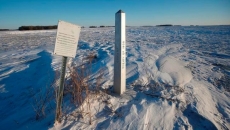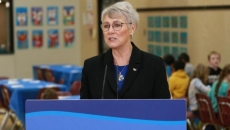OTTAWA - A battle is brewing between Canadian defence officials and federal decision-makers as the Trudeau government looks for ways to save billions of dollars over the next few years.
Experts say last week's budget and the delays in a planned update to the defence policy are signs of this pending conflict, with ramifications for Canada's military and its international reputation.
The budget contains virtually no new defence funding, but does include several cost-cutting measures, notably an order for departments and agencies to identify ways to cut spending by three per cent over the next few years.
And while the government says the Canadian Armed Forces will be excluded from such cuts, it remains unclear the degree to which the exemption will extend to the Department of National Defence, which controls the military's budget.
"Regarding the reduction in eligible spending by departments and agencies, as indicated in Budget 2023, the reduction will not impact the Canadian Armed Forces," Finance Department spokeswoman Marie-France Faucher said in an email.
"This includes DND spending that is related to the Canadian Armed Forces."
That has left experts confused, given how intertwined the two organizations are, with much of the work of the Defence Department directly impacting military management, operations and procurement.
"I'm trying to think of what DND spending would be unrelated to the CAF," said David Perry, president of the Canadian Global Affairs Institute think tank and one of Canada's foremost authorities on military spending.
That confusion has been magnified by uncertainty around the Liberal government's plan to upgrade its defence policy, which was first released in 2017 and promised tens of billions in new funding for the military.
The Liberals announced the update in last year's budget and observers expected it by the fall, but it remains in limbo. Defence Minister Anita Anand recently announcing the launch of public consultations through April 30 to inform the update.
Officials across Ottawa have also been ordered to spend less on contractors, which Perry said will hit the Defence Department hard since it is one of the largest users of outside firms for the provision of engineering, logistical and management services.
That includes helping with the procurement of new military equipment.
All of this comes at a time when the government is facing pressure to put more money into other priorities, including health and dental care, clean energy and social programs for Canadians who are struggling — while trying to keep spending under control.
Defence and military officials might be crossing their fingers that they will be saved from having to cut, said Canadian Forces College professor emeritus Craig Stone, another national authority on defence spending.
"But I cannot see the town agreeing to everyone else having to come up with three per cent and DND not," he said. "Just when you think about it, it's the largest discretionary spending bit for government."
The Defence Department's roughly $27-billion budget is not the largest in the federal government, but most of the others are required to spend the money on services and benefits to Canadians and other levels of government.
That doesn't mean defence spending is set to fall overall, as the government has promised to spend billions of additional dollars over the next few years on new fighter jets, warships, radar systems and other high-priced equipment.
Experts say it simply won't increase as much as previously expected, even though Canada's allies are pushing for the opposite.
The budget document says spending by the Defence Department will reach nearly $40 billion by 2026-27 as a result of those additional investments, but the government is not saying what that means as a share of Canada's gross domestic product.
Officials last year said the provisions in the 2022 federal budget would leave spending at 1.5 per cent of GDP by 2027.
That represents an increase over the 1.29 per cent last year, but will leave Canada far short of the two per cent target established by NATO allies — and potentially heading the other way, depending on the cuts to the Defence Department.
Retired lieutenant-general Guy Thibault, head of the Conference of Defence Associations Institute think tank, said it suggests the Liberal government has different priorities — and a willingness to accept the risks of not doing more for the military.
"It is obvious in the aftermath of (U.S. President Joe Biden's) visit and the messaging in this budget that the prime minister, deputy prime minister or cabinet are not convinced that more investments in defence will result in greater influence with the U.S. or allies," he said.
"And obviously they do not truly believe in the threats we are facing. This is simply a continuation of historical government practice of accepting the risk and spending the least amount on defence as they can possibly get away with."






